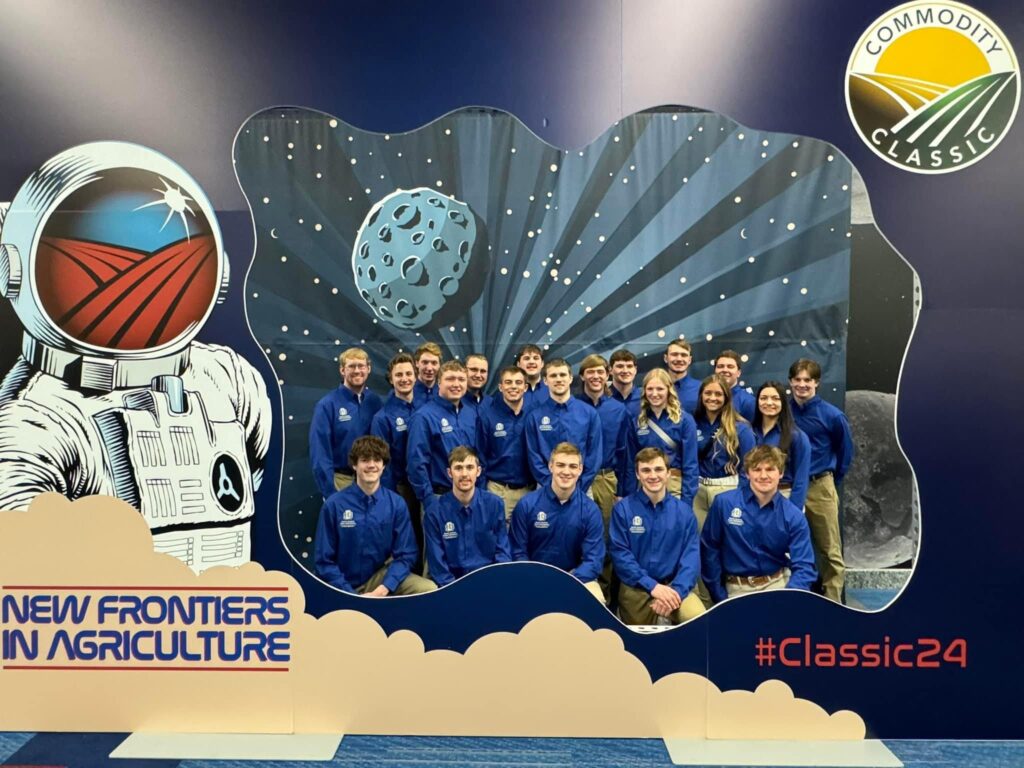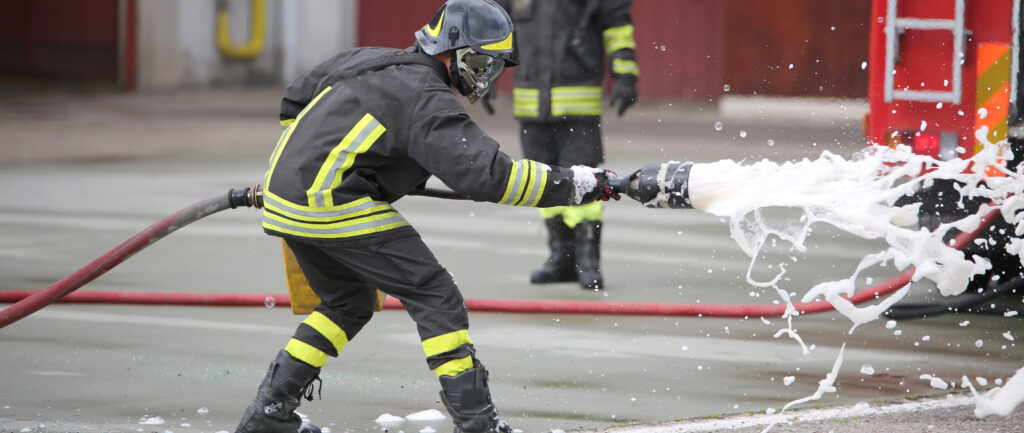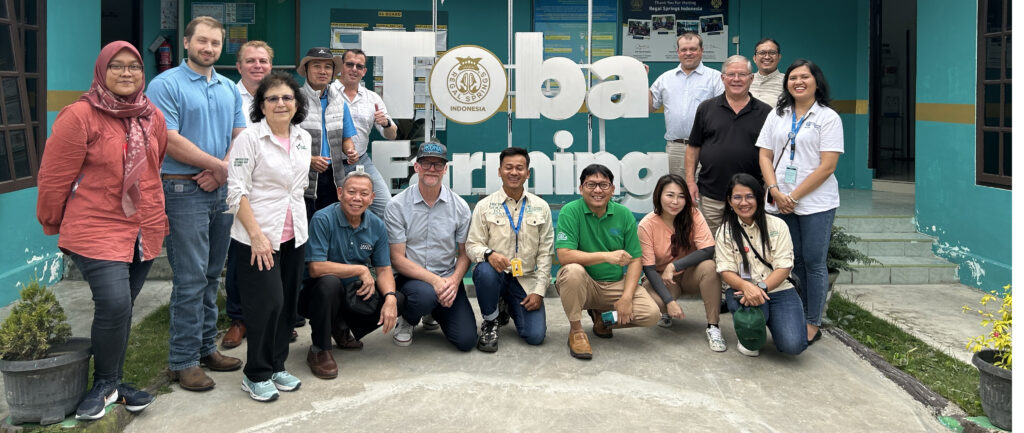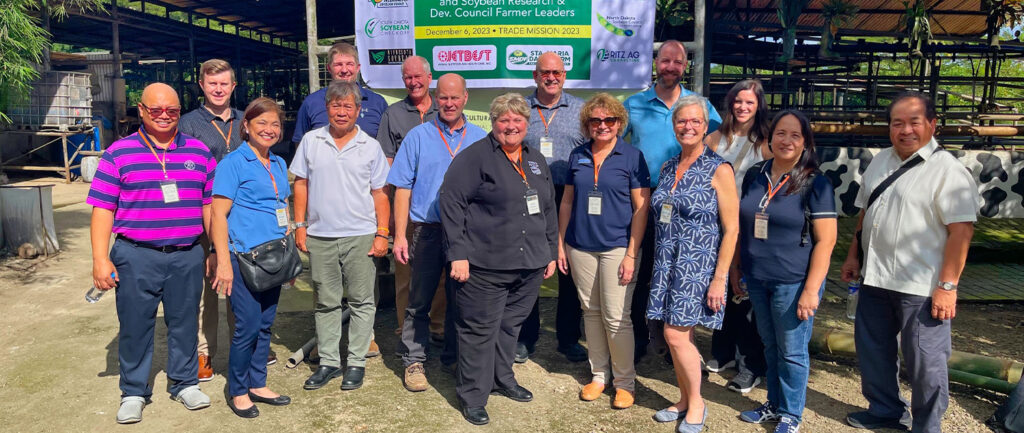The 2024 Commodity Classic lifted off with its theme, “New Frontiers in Agriculture,” which proved to be true when attendees saw a sea of blue in the crowds of the trade show floor, in state caucus meetings and educational sessions.
That sea of blue was a group of 22 South Dakota State University (SDSU) students who traveled 20 hours down to Houston, Texas, in three vans – one of which was temporarily sidelined with a flat tire.
Prior to Classic, it was one student’s vision that was presented to both the Minnesota Soybean Research & Promotion Council (MSR&PC) board and the South Dakota Soybean Checkoff board to help fund the trip.
“I was talking to Luke Gordon in the fall, and he came up with the idea of bringing a group of SDSU students, and I knew it would be a really great opportunity,” said Kade Wassman, SDSU ag business student.

Luke Gordon, the son of past American Soybean Association (ASA) president and Minnesota Soybean Growers Association (MSGA) Director Bill Gordon, then asked Minnesota and South Dakota’s state soybean boards for financial support.
“It seemed like this would be a good experience to share with friends who have similar interests,” said Gordon, whose family operates a century farm in Worthington.
Students from two clubs had the opportunity to attend Commodity Classic – the Agronomy and Precision Ag Club and the Jackrabbit Agricultural Technology and Engineering Club.
Following their travels, students had a meet-and-great with both MSR&PC and MSGA directors and had the opportunity to see the difference between the two organizations throughout the show.
“We are sitting in the caucus meetings having students realize the importance these positions play to their farm back home, said Nicholas Uilk, SDSU lecturer and Klingbeil endowed educator in Precision Agriculture. “I hope students see the impact and hopefully someday our students will be the ones sitting in this room.”
For Wassman, he was excited to attend some of the sessions.
“I was looking at some of the sessions and they are very applicable for back home to help aid in furthering the family farm,” Wassman said. “There’s also a couple ones in cybersecurity that is something different, something unique, that I think can help impact not only my local area, my farm, but also my walk at SDSU.”
Adam Guetter, a director with MSGA and ASA offered advice to the students.
“Take it all in while you’re here,” he said.
Full circle
With a near-record class of first-time students (2,275) attending in the 2023-24 academic year, SDSU continues to be one of the top picked universities in the Midwest.
The College of Agriculture, Food and Environmental Sciences draws in 15.5% of the student population. The Council, which invests checkoff projects toward promoting emerging farmers, find value in supporting SDSU’s efforts.
“This program could have a lot of legs,” Council Chair Tom Frisch said.
In 2021, MSR&PC supported SDSU’s Raven Precision Ag Building with checkoff resources, which helped fund the study wing of the facility.
“We have been in the Raven facility for three years, and it’s been amazing,” Uilk said. “We have had the ability to teach new technology, hands on labs and modern equipment in the classroom. It’s really increased the ability to interact with industry and get students exposed to different career paths.”
In 2016, SDSU became the nation’s first land-grant university to offer both a bachelor’s degree and minor in precision agriculture. SDSU introduced a minor in precision agriculture in 2015.
“Agriculture is getting harder and harder, and we’ll need the next generation of professionals to lead us,” MSR&PC CEO Tom Slunecka said.
Slunecka has enjoyed seeing SDSU prosper and build its agriculture department and as a result loved seeing the students down at Commodity Classic.
“Our future is right here in this room,” he said.
Established in 1996, Commodity Classic features a robust schedule of more than 30 educational sessions, two trade show floors with over 430 exhibitors featuring the latest technology, equipment and innovation, inspiring speakers, unique tours and the opportunity to network with thousands of farmers from across the nation.
“This is such a cool opportunity, and we really appreciate Minnesota Soybean doing this,” said Jesse Enstad, program coordinator in SDSU’s ag department. “It means a lot to us.”







